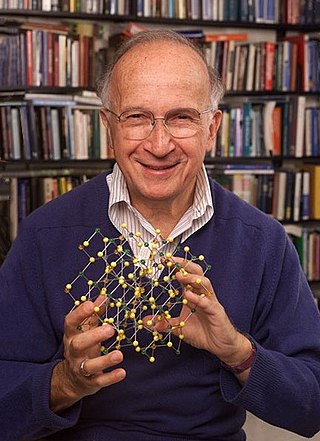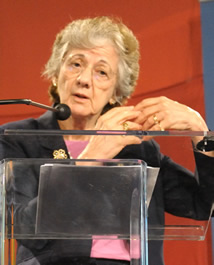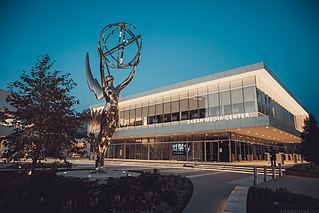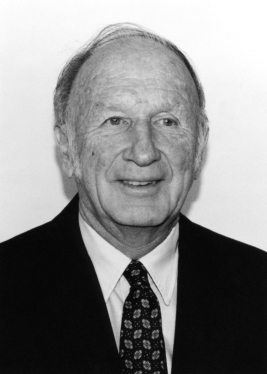
Roald Hoffmann is a Polish-American theoretical chemist who won the 1981 Nobel Prize in Chemistry. He has also published plays and poetry. He is the Frank H. T. Rhodes Professor of Humane Letters, Emeritus, at Cornell University, in Ithaca, New York.

The Indian Institute of Science (IISc) is a public, deemed, research university for higher education and research in science, engineering, design, and management. It is located in the southern Indian city of Bangalore, Karnataka. The institute was established in 1909 with active support from Jamsetji Tata and thus is also locally known as the "Tata Institute". It is ranked among the most prestigious academic institutions in India and has the highest citation-per-faculty among all the universities in the world. It was deemed a university in 1958 and an Institute of Eminence in 2018.

The National Academy of Sciences (NAS) is a United States nonprofit, non-governmental organization. NAS is part of the National Academies of Sciences, Engineering, and Medicine, along with the National Academy of Engineering (NAE) and the National Academy of Medicine (NAM).
The Academy Award for Best Documentary Feature Film is an award for documentary films. In 1941, the first awards for feature-length documentaries were bestowed as Special Awards to Kukan and Target for Tonight. They have since been bestowed competitively each year, with the exception of 1946. Copies of every winning film are held by the Academy Film Archive.
Triple Crown may refer to:

Proceedings of the National Academy of Sciences of the United States of America is a peer-reviewed multidisciplinary scientific journal. It is the official journal of the National Academy of Sciences, published since 1915, and publishes original research, scientific reviews, commentaries, and letters. According to Journal Citation Reports, the journal has a 2021 impact factor of 12.779. PNAS is the second most cited scientific journal, with more than 1.9 million cumulative citations from 2008 to 2018. In the mass media, PNAS has been described variously as "prestigious", "sedate", "renowned" and "high impact".

The American Academy of Arts and Sciences (AAA&S) is one of the oldest learned societies in the United States. It was founded in 1780 during the American Revolution by John Adams, John Hancock, James Bowdoin, Andrew Oliver, and other Founding Fathers of the United States. It is headquartered in Cambridge, Massachusetts.

Rita Rossi Colwell is an American environmental microbiologist and scientific administrator. Colwell holds degrees in bacteriology, genetics, and oceanography and studies infectious diseases. Colwell is the founder and Chair of CosmosID, a bioinformatics company. From 1998 to 2004, she was the 11th Director and 1st female Director of the National Science Foundation.

Sylvia Alice Earle is an American marine biologist, oceanographer, explorer, author, and lecturer. She has been a National Geographic explorer-in-residence since 1998. Earle was the first female chief scientist of the U.S. National Oceanic and Atmospheric Administration, and was named by Time Magazine as its first Hero for the Planet in 1998.
National Research Council may refer to:

The Academy of Television Arts & Sciences (ATAS), also colloquially known as the Television Academy, is a professional honorary organization dedicated to the advancement of the television industry in the United States. It is a 501(c)(6) non-profit organization founded in 1946, the organization presents the Primetime Emmy Awards, an annual ceremony honoring achievement in U.S. primetime television.

Vulimiri Ramalingaswami was an Indian medical scientist, pathologist and medical writer. His pioneering research on nutrition got him elected to the National Academy of Sciences, Russian Academy of Medical Sciences and the Royal Society of London.

Edward Norton Lorenz was an American mathematician and meteorologist who established the theoretical basis of weather and climate predictability, as well as the basis for computer-aided atmospheric physics and meteorology. He is best known as the founder of modern chaos theory, a branch of mathematics focusing on the behavior of dynamical systems that are highly sensitive to initial conditions.
The Primetime Emmy Awards, or Primetime Emmys, are part of the extensive range of Emmy Awards for artistic and technical merit for the American television industry. Bestowed by the Academy of Television Arts & Sciences (ATAS), the Primetime Emmys are presented in recognition of excellence in American primetime television programming. The award categories are divided into three classes: the regular Primetime Emmy Awards, the Primetime Creative Arts Emmy Awards to honor technical and other similar behind-the-scenes achievements, and the Primetime Engineering Emmy Awards for recognizing significant contributions to the engineering and technological aspects of television. First given out in 1949, the award was originally referred to as simply the "Emmy Award" until the International Emmy Award and the Daytime Emmy Award were created in the early 1970s to expand the Emmy to other sectors of the television industry.

John Cromwell Mather is an American astrophysicist, cosmologist and Nobel Prize in Physics laureate for his work on the Cosmic Background Explorer Satellite (COBE) with George Smoot.

Salman Amin "Sal" Khan is an American educator and the founder of Khan Academy, a free online non-profit educational platform and an organization with which he has produced over 6,500 video lessons teaching a wide spectrum of academic subjects, originally focusing on mathematics and science. He is also the founder of Khan Lab School, a brick-and-mortar private school in Mountain View, California.

R. L. Stine's The Haunting Hour: The Series is an original anthology horror-fantasy television series which is based on the 2007 movie R.L Stine's The Haunting Hour: Don't Think About It and the anthologies The Haunting Hour and Nightmare Hour by R.L. Stine, that originally aired on The Hub Network from October 29, 2010 to October 11, 2014. The only story taken from The Haunting Hour anthology was My Imaginary Friend, and the only story unused from The Nightmare Hour was Make Me a Witch. The fourth season's seven remaining episodes ran on Discovery Family from October 18, 2014 to November 29, 2014. The series was produced by Front Street Pictures, The Hatchery, Incendo Films, and Endemol.
The National Academy of Engineering most commonly refers to the academy in the United States.
Suhash Chandra Dutta Roy is an Indian electrical engineer and a former professor and head of the department of electrical engineering at the Indian Institute of Technology, Delhi. He is known for his studies on analog and digital signal processing and is an elected fellow of all the three major Indian science academies viz. Indian Academy of Sciences, Indian National Science Academy, National Academy of Sciences, India as well as the Institute of Electrical and Electronics Engineers, Institution of Electronics and Telecommunication Engineers, Systems Society of India and Acoustical Society of India, The Council of Scientific and Industrial Research, the apex agency of the Government of India for scientific research, awarded him the Shanti Swarup Bhatnagar Prize for Science and Technology, one of the highest Indian science awards for his contributions to Engineering Sciences in 1981.
Javed Naim Agrewala is an Indian immunologist, the prof. at Indian Institute of Technology Ropar and the chief scientist and professor at the Institute of Microbial Technology, Chandigarh. Known for his research on Tuberculosis, Agrewala is an elected fellow of all the three major Indian science academies viz. National Academy of Sciences, India, Indian National Science Academy and Indian Academy of Sciences. The Council of Scientific and Industrial Research, the apex agency of the Government of India for scientific research, awarded him the Shanti Swarup Bhatnagar Prize for Science and Technology, one of the highest Indian science awards for his contributions to Medical Sciences in 2005. He is also a recipient of the National Bioscience Award for Career Development of the Department of Biotechnology.












